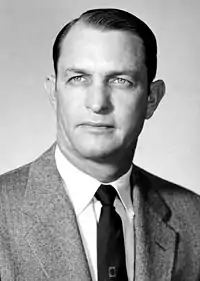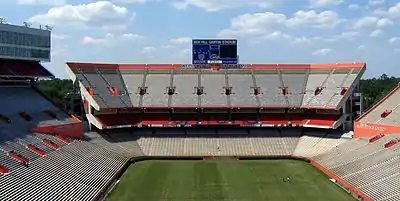Ben Hill Griffin Jr.
Ben Hill Griffin Jr. (October 20, 1910 – March 1, 1990) was a prominent American businessman, citrus producer, politician, and philanthropist who was a native and resident of Florida. He was an alumnus of the University of Florida, a former legislator, one-time candidate for governor, and a patron of college sports and higher education in Florida. Several of his grandchildren remain active in Florida politics. Griffin is the subject of the final chapter of John McPhee's work of creative nonfiction 'Oranges'.
Ben Hill Griffin Jr. | |
|---|---|
 | |
| Born | October 20, 1910 Tiger Bay, Florida |
| Died | March 1, 1990 (aged 79) |
| Nationality | United States |
| Alma mater | University of Florida |
| Known for | Businessman Citrus Grower politician Philanthropist |
Early life and education
Griffin was born during a hurricane in the former town of Tiger Bay, near Fort Meade, Florida.[1] He attended Frostproof High School in Frostproof, Florida, where he was responsible for starting the high school football program in 1929.[2] After graduating from high school, Griffin studied economics, marketing, and agriculture at the University of Florida in Gainesville, Florida,[3] where he was a member of Pi Kappa Phi Fraternity (Alpha Epsilon chapter).
Citrus and agri-business
In 1933, Griffin left the University of Florida after three years without earning a degree to find a job during the Great Depression.[3] He unsuccessfully sought work in New York City, then returned home to Frostproof, Florida and began his business with a 10-acre (4.0 ha) orange grove, a wedding gift from his father, and built it into a citrus business empire.[4]
In 1961, Griffin was named to the board of directors of Atlantic Land & Improvement Company, Inc., the land-holding subsidiary of the Atlantic Coast Line Railroad and commonly known as "Alico."[5] Alico, Inc. became a publicly traded corporation engaged in citrus fruit, sugarcane and sod production, cattle ranching, and forestry.[6] Griffin acquired a majority of the outstanding stock of Alico in 1972 and became chairman of its board of directors in 1973.[5] Griffin was also chief executive officer of Ben Hill Griffin, Inc., a family-owned business with citrus and other agriculture interests. In 1989, the year before his death, he was ranked 261st on the Forbes 400 list of richest Americans.[7]
Florida politics
Griffin, a Democrat, was a member of the Florida Legislature for twelve years—four years in the Florida Senate and eight years in the Florida House of Representatives. In 1974, he lost the Democratic primary for Governor of Florida to Reubin Askew.
Philanthropy
Griffin and his family have been generous donors to higher education in Florida, especially his alma mater, the University of Florida; over the years, he donated more than $20 million to the university and its athletic programs.[8] In 1989, Florida Field, the university's football stadium, was officially renamed Ben Hill Griffin Stadium at Florida Field.[9] Floyd Hall, one of the university's historic academic buildings, was restored due in part to Griffin's donations and was renamed Griffin-Floyd Hall upon its reopening in 1992.[3] For his support of the Florida Gators sports programs, Griffin was inducted into the University of Florida Athletic Hall of Fame as an "honorary letter winner" in 1982.[10][11]
After Griffin's death, Alico, Inc., the company he built into a successful diversified agribusiness, contributed approximately 760 acres (3.1 km2) in Lee County, Florida for the development of Florida Gulf Coast University (FGCU), Florida's tenth state university.[12] Alico Arena, FGCU's indoor sports arena, is named for the company.[13] The elementary school in his hometown of Frostproof is also named for Griffin.[14]
Family and legacy
When Griffin died in 1990, he was survived by his wife Eleanor, a son, four daughters, and sixteen grandchildren.[7] Griffin's only son, Ben Hill Griffin, III, carried on his father's family business and served as the CEO of Alico until 2004, and Alico was sold in 2014.[15] Griffin's son continues to serve as the chairman of Ben Hill Griffin, Inc.,[16] and one of FGCU's primary academic buildings, Griffin Hall, is named for him.[17] Griffin's grandson and namesake, Ben Hill Griffin, IV, serves as the current president of Ben Hill Griffin, Inc., which is one of the member companies of the Florida's Natural cooperative.[18]

Following in the family footsteps, three of Griffin's grandchildren have served in elected political office in Florida. Republican Katherine Harris, a former member of the Florida Senate, former Florida Secretary of State (best known for her role in the disputed 2000 presidential election), and former United States Representative from Sarasota, is Griffin's granddaughter.[19] Republican J.D. Alexander, a former member of both the Florida House of Representatives and Florida Senate, is his grandson.[20] Republican Baxter Troutman, a former member of the Florida House of Representatives, is also Griffin's grandson.[21]
In 1998, a panel of Florida historians and other consultants named Griffin one of the fifty most important Floridians of the twentieth century.[22]
See also
- Florida Gators football
- History of Florida
- History of the University of Florida
- List of Pi Kappa Phi alumni
- List of University of Florida alumni
- List of University of Florida Athletic Hall of Fame members
References
- Cinnamon Bair, "Polk County Chronicles: Tiger Bay a Town for A While," The Ledger (July 12, 2009). Retrieved August 21, 2009
- Mike Cobb, "Two Decades of Growth: 1920s and '30s Saw the Start of Many Local Traditions," The Ledger (November 29, 2007). Retrieved August 21, 2009.
- University of Florida Foundation, Named UF Facilities, B.H. Griffin – W.L. Floyd Hall. Retrieved August 22, 2009.
- Tait Trussell, "The last of the citrus barons—Ben Hill Griffin Jr.," Nation's Business, p. 46 (February 1989). Retrieved August 22, 2009.
- FundingUniverse.com, Alico, Inc. Company History. Retrieved August 22, 2009.
- Alico, Inc. web site. Retrieved August 22, 2009.
- Alfonso A. Narvaez, "Ben Hill Griffin Jr., 79, is Dead; Leader in Florida Citrus Industry," The New York Times, Section A, Page 18, Column 4 (March 2, 1990). Retrieved August 22, 2009.
- Durward Buck, "Polk County Hall of Fame: Griffin Honors Father at Banquet," The Ledger (June 27, 2007). Retrieved August 21, 2009.
- GatorZone.com, Facilities, Ben Hill Griffin Stadium at Florida Field Archived February 9, 2010, at the Wayback Machine. Retrieved August 22, 2009.
- F Club, Hall of Fame, Honorary Letter Winners. Retrieved December 19, 2014.
- Jack Hairston, "13 Go Into Hall of Fame," The Gainesville Sun, p. 3B (April 14, 1982). Retrieved July 23, 2011.
- Kate Spinner, "FGCU Begins Search For New President," The Ledger (January 20, 2007). Retrieved August 21, 2009.
- Florida Gulf Coast University, Alico Arena History Archived July 26, 2009, at the Wayback Machine. Retrieved August 22, 2009.
- Polk County Public Schools, Ben Hill Griffin Jr. Elementary School web page Archived August 15, 2010, at the Wayback Machine. Retrieved August 22, 2009.
- Bill Rufty, "Griffin Heirs Remove Troutman From Board: Lawmaker is replaced by pro-development Sen. Alexander," The Ledger (January 19, 2008). Retrieved August 29, 2009.
- AllBusiness.com, "Ben Hill Griffin III Steps Down as Chairman of Alico Inc.," Business Wire (February 26, 2004). Retrieved August 22, 2009.
- Florida Gulf Coast University, On-Line Tour, Ben Hill Griffin III Hall Archived June 1, 2010, at the Wayback Machine. Retrieved August 22, 2009.
- Florida's Natural Growers, Meet the Growers, Ben Hill Griffin IV Profile Archived April 5, 2009, at the Wayback Machine. Retrieved August 22, 2009.
- "Katherine Harris Bio," Orlando Sentinel (undated). Retrieved August 22, 2009.
- Florida Senate, J.D. Alexander Profile. Retrieved August 22, 2009.
- Bill Rufty, "Learning Grandfather's Lessons Well," The Ledger (March 24, 2008). Retrieved August 21, 2009.
- The 50 Most Important Floridians of the 20th Century, newspaper magazine published by The Ledger, Lakeland, Florida (March 1, 1998).
